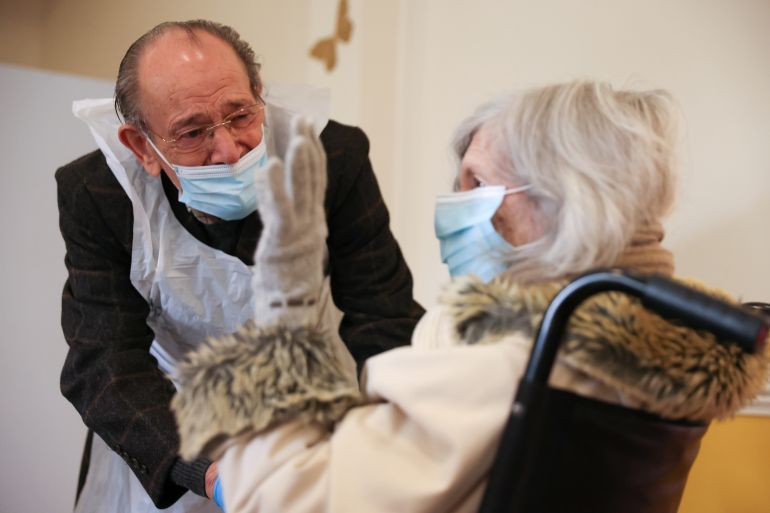Britons welcome vaccine news, but some raise concerns
As the UK becomes first to approve Pfizer-BioNTech’s COVID-19 vaccine, Britons hope move frees country from perils of virus.

London, United Kingdom – The United Kingdom has become the first country to approve Pfizer-BioNTech’s COVID-19 vaccine for widespread use, a landmark move which will see the drug in use as early as next week.
Care home residents, health and care staff, the elderly and people who are clinically extremely vulnerable will be first in line to receive the vaccine.
Keep reading
list of 3 itemsPfizer-BioNTech’s vaccine: What you need to know in 500 words
EU criticises ‘hasty’ UK approval of COVID-19 vaccine
The UK is currently battling Europe’s worst outbreak of COVID-19, with more than 1.6 million cases of the novel coronavirus having been recorded since the pandemic began in late 2019.
More than 59,000 people have died, according to official figures.
Experts welcomed the UK’s move.
“The timeline has been fast, but also we need to think about this unique context that we are in – we have over 200 companies that have been focusing on developing a vaccine, they have unlimited resources and all of the world’s talents have been focused on this problem,” Oksana Pyzik, a teaching fellow at University College London’s School of Pharmacy, told Al Jazeera.
“It just shows that when the urgency is there, and when the finances are there … what kind of scientific innovation is possible.”
Sterghios Moschos, a molecular biologist at the UK’s Northumbria University, sought to assuage concerns over the speed at which the UK’s Medicines and Healthcare products Regulatory Agency (MHRA), approved the vaccine.
“The review process used has not been the classical approval process … this is what is known as an emergency use authorisation, which has certain facilitations where the risk/benefit proposition is looked at and the need for society and the economy is put at parity with safety,” he said.
“But every single batch of the vaccine will be tested and confirmed to be of the same quality, quantity and composition.”
Al Jazeera spoke to people across the UK to gauge their reactions:
‘I’m looking forward to taking it up’
Amanda Morris, university lecturer, Cardiff:
“As someone who’s in a higher-risk category for COVID-19, since last March I’ve put a lot of effort into self-isolation, and while I’ve managed to avoid catching the virus, I’m the first to admit that the detriment to my mental health has been great.
“I have a lot of friends in the medical profession, and through speaking with them, I’ve understood that the resources poured into vaccines’ development are the reason behind the quick turnaround.
“I understand why some may be concerned, and I do not think that anyone should feel obliged to have the jab if they don’t feel safe to do so. But for me, the potential risks are far less than the risks of contracting the virus, or even of continuing to live with so little human contact. I’m looking forward to taking it up when offered.”
‘Welcome news but somewhat concerning’
Diarmaid McDonald, organiser at patient-led campaign group Just Treatment, Bristol:
“This is welcome news, although it is somewhat concerning that the US and others will take a little bit longer to approve the vaccine to allow time for public hearings and independent analysis of the data.
“But more critically, this is just the beginning of the end of chapter one of the vaccine effort – part two is arguably more fraught and more important: getting it to everyone who needs it.”
‘It’s about the functionality of the vaccines’
Sharmeen Suleman, travel agent, Leicester:
“For me, the question is less about the safety. It’s about the functionality of the vaccines on offer and the necessity of them to carry on doing what we did pre-COVID-19. For example, going to the cinema, international travel, even perhaps how it may affect employment.
“I wonder whether we will require COVID-19 vaccinations in order to secure travel insurance?”
‘We will need more than a few vaccines to cover the world’
Aamnah Rahman, community researcher, Bradford:
“I’m pleased that the Pfizer vaccine has been approved. But I’m still committed to the Novavax trial I’m part of in Bradford, because we will need more than a few vaccines to cover the world.
“My family are mainly key workers (NHS, care home and public transport workers) so I know the risks they are all taking in going out to do their jobs during this pandemic. I also live in the inner city and know how this virus has affected our communities so disproportionately, so the vaccine is really important.
“Having more than a few vaccines allows doctors to assess which will be best for individuals given underlying health conditions.”